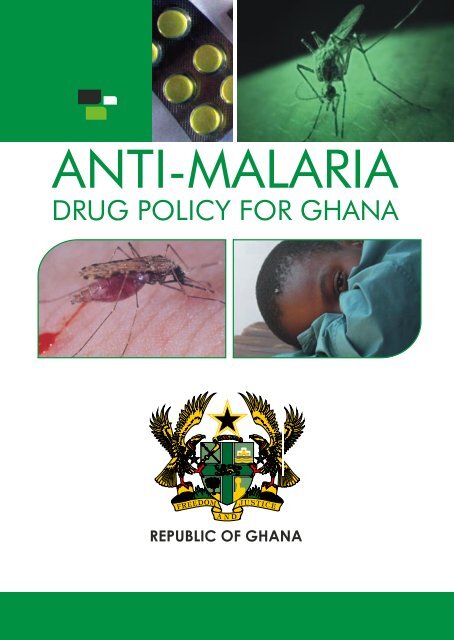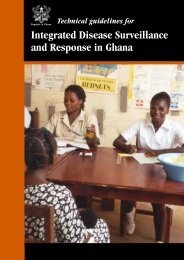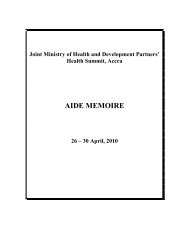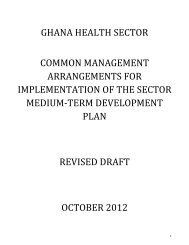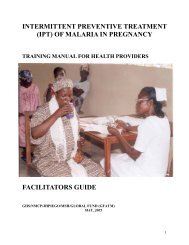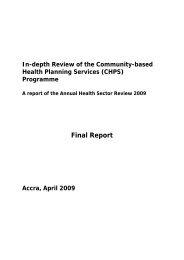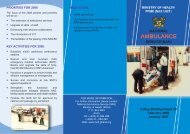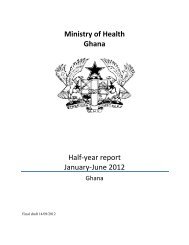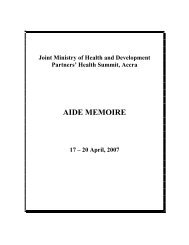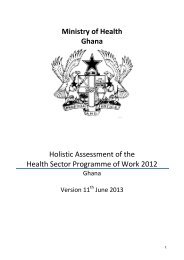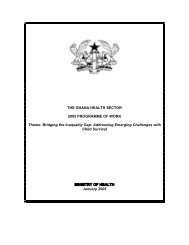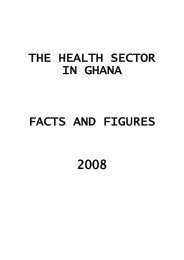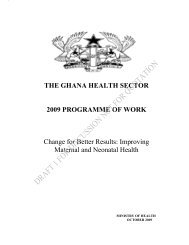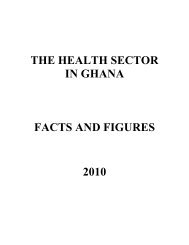Anti-Malaria Drug Policy - Ghana Health Service
Anti-Malaria Drug Policy - Ghana Health Service
Anti-Malaria Drug Policy - Ghana Health Service
Create successful ePaper yourself
Turn your PDF publications into a flip-book with our unique Google optimized e-Paper software.
ANTI-MALARIA<br />
DRUG POLICY FOR GHANA<br />
REPUBLIC OF GHANA
ANTI-MALARIA DRUG POLICY FOR GHANA<br />
ANTI-MALARIA<br />
DRUG POLICY FOR GHANA<br />
Ministry of <strong>Health</strong><br />
st<br />
1 Revised Version 2007<br />
nd<br />
2 Revised Version 2009<br />
MINISTRY OF HEALTH
ANTI-MALARIA DRUG POLICY FOR GHANA<br />
TABLE OF<br />
CONTENTS<br />
Preface<br />
Acknowledgement<br />
Working Group<br />
Introduction<br />
Situation Analysis<br />
<strong>Policy</strong> Change for <strong>Drug</strong> Use in <strong>Malaria</strong><br />
Chemoprophylaxis of <strong>Malaria</strong> in Pregnancy<br />
<strong>Malaria</strong> Prophylaxis in Non Immunes<br />
Steps Involved in the Change Process<br />
Capacity Building and Public Education<br />
Monitoring and Evaluation<br />
Standards and Regulation<br />
iv<br />
v<br />
vii<br />
1<br />
3<br />
7<br />
12<br />
13<br />
15<br />
19<br />
21<br />
22<br />
MINISTRY OF HEALTH<br />
I
ANTI-MALARIA DRUG POLICY FOR GHANA<br />
LIST OF ABBREVIATIONS<br />
ACT Artemisinin based combination therapy<br />
AMDP <strong>Anti</strong>-<strong>Malaria</strong> <strong>Drug</strong> <strong>Policy</strong><br />
ANCs Antenatal Clinics<br />
BCC Behaviour Change Communication<br />
CBA Community-Based Agent<br />
CBHWs Community-Based <strong>Health</strong> Workers<br />
CHIM Centre for <strong>Health</strong> Information Management<br />
DFID Department for International Development<br />
DHMT District <strong>Health</strong> Management Team<br />
DOT Directly Observed Therapy<br />
EPI Expanded Programme on Immunisation<br />
FDB Food and <strong>Drug</strong>s Board<br />
G6PD Glucose-6 phosphate dehydrogenase<br />
GHS <strong>Ghana</strong> <strong>Health</strong> <strong>Service</strong><br />
GoG Government of <strong>Ghana</strong><br />
HBC Home Based Care<br />
HIS <strong>Health</strong> Information System<br />
HPU <strong>Health</strong> Promotion Unit<br />
HRU <strong>Health</strong> Research Unit<br />
IEC Information, Education and Communication<br />
IMCI Integrated Management of Childhood Illnesses<br />
IPT Intermittent Presumptive Treatment<br />
ITMs Insecticide Treated Materials<br />
ITNs Insecticide Treated Nets<br />
JICA Japan International Coorporation Agency<br />
KABP Knowledge, Attitude, Belief and Practice<br />
M&E Monitoring and Evaluation<br />
MINISTRY OF HEALTH<br />
ii
ANTI-MALARIA DRUG POLICY FOR GHANA<br />
MoH Ministry of <strong>Health</strong><br />
NMCP National <strong>Malaria</strong> Control Programme<br />
NGOs Non-governmental Organizations<br />
NID National Immunization Day<br />
OPD Out-Patients Department<br />
RCH Reproductive and Child <strong>Health</strong><br />
RBM Roll Back <strong>Malaria</strong><br />
RHMTs Regional <strong>Health</strong> Management Teams<br />
SP Sulphadoxine-Pyrimethamine<br />
TBAs Traditional Birth Attendants<br />
UNICEFUnited Nations Children Fund<br />
USAID United States Agency for International<br />
Development<br />
WHO World <strong>Health</strong> Organization<br />
MINISTRY OF HEALTH<br />
iii
ANTI-MALARIA DRUG POLICY FOR GHANA<br />
PREFACE<br />
This revised edition of the <strong>Anti</strong>-<strong>Malaria</strong> <strong>Drug</strong> <strong>Policy</strong> is based<br />
on current evidence on malaria treatment and lessons<br />
learnt in the implementation of the previous policy.<br />
The revision is borne out of consultative meetings of all<br />
relevant stakeholders involved in malaria case<br />
management in the country. This document is written in very<br />
simple and precise language to make it easy for everyone to<br />
read and understand.<br />
I implore all stakeholders and health professionals to<br />
ensure that the guidelines contained in this document are<br />
complied with both in the Private and Public sectors in order<br />
to ensure effective treatment of malaria and reduce the<br />
malaria burden in our country.<br />
It is my hope that, the New <strong>Malaria</strong> Treatment <strong>Policy</strong> will<br />
form the basis for the standardization of the management<br />
of all types of malaria throughout the country as it supports<br />
the new paradigm of creating wealth through health.<br />
Hon. Dr. George Sipa-Adjah YANKEY<br />
Minister of <strong>Health</strong><br />
MINISTRY OF HEALTH<br />
iv
ACKNOWLEDGEMENT<br />
ANTI-MALARIA DRUG POLICY FOR GHANA<br />
The <strong>Anti</strong>-<strong>Malaria</strong> <strong>Drug</strong> <strong>Policy</strong> Review Task Team wishes to<br />
acknowledge the contribution of the following persons to<br />
the process:<br />
MOH /GHS Executives<br />
Madam Salamata Abdul-Salam,<br />
CHIEF DIRECTOR, MOH<br />
Dr. Elias Sory,<br />
DIRECTOR-GENERAL, GHS<br />
Dr. George Amofah,<br />
DEPUTY DIRECTOR-GENERAL, GHS<br />
Dr. Joseph Amankwaa,<br />
DIRECTOR OF PUBLIC HEALTH<br />
Development Partners<br />
UNITED STATES AGENCY FOR INTERNATIONAL<br />
DEVELOPMENT (USAID)<br />
WORLD HEALTH ORGANISATION (WHO)<br />
UNITED NATIONS CHILDREN'S FUND (UNICEF)<br />
MINISTRY OF HEALTH<br />
v
ANTI-MALARIA DRUG POLICY FOR GHANA<br />
Members of the Technical Committee<br />
Dr. Francis Offei University of <strong>Ghana</strong> Medical<br />
School<br />
Mr. Philip Anum National <strong>Drug</strong> Information<br />
Resource Centre<br />
Dr. Nicholas Tweneboa Trust Hospital<br />
Dr. Alex Dodoo Centre for Tropical Clinical<br />
Pharmacology & Therapeutics<br />
Dr. M.O. Mate-Kole University of <strong>Ghana</strong> Medical<br />
School<br />
Dr. G.O. Klufio University of <strong>Ghana</strong> Medical<br />
School<br />
Dr. Felicia Owusu-Antwi World <strong>Health</strong> Organisation<br />
Mrs. Edith A. Annan World <strong>Health</strong> Organisation<br />
Dr. Kenneth Aboah KNUST/ Komfo-Anokye Teaching<br />
Hospital<br />
Dr. George Amofah <strong>Ghana</strong> <strong>Health</strong> <strong>Service</strong><br />
Mr. Isaac Adams Ministry of <strong>Health</strong><br />
Dr. R.A. Kwame Aryee University of <strong>Ghana</strong> Medical<br />
School<br />
Mr. Sylvester Segbaya National <strong>Malaria</strong> Control<br />
Programme<br />
Prof. Kwadwo Koram Noguchi Memorial Inst. For<br />
Medical Research<br />
Dr. (Mrs.) C. Bart-Plange National <strong>Malaria</strong> Control<br />
Programme<br />
MINISTRY OF HEALTH<br />
vi
ANTI-MALARIA DRUG POLICY FOR GHANA<br />
Mrs. Martha<br />
Gyansa-Lutterodt<br />
Mr. Anthony Mensah<br />
Dr. Addo-Yobo<br />
Dr. Bernard C. Nkum<br />
Mrs. F. Amah-Nkansah<br />
Dr. (Mrs.) E. Ofori-Adjei<br />
Mr. Felix D.Yellu<br />
ACP. A. K. Y. Kokukokor<br />
Mr. Ben Botwe<br />
Mr. Raymond Tetteh<br />
Prof. David Ofori-Adjei<br />
<strong>Ghana</strong> National <strong>Drug</strong>s<br />
Programme<br />
Komfo-Anokye Teaching Hospital<br />
Komfo-Anokye Teaching Hospital<br />
Komfo-Anokye Teaching Hospital<br />
Korle-Bu Teaching Hospital<br />
University of <strong>Ghana</strong> Hospital,<br />
Legon<br />
<strong>Ghana</strong> <strong>Health</strong> <strong>Service</strong><br />
Police Hospital<br />
Food and <strong>Drug</strong>s Board<br />
Korle-Bu Teaching Hospital<br />
Noguchi Memorial Inst. For<br />
Medical Research<br />
Working Group<br />
Dr. Nii Laryea Browne<br />
Mr. Edwin T. Adams<br />
Comrade Solomon<br />
Onubuogu<br />
Dr. Ben D. Annan<br />
Dr. C. Jehu-Appiah<br />
Department of Community<br />
Heath, KNUST<br />
Rep, <strong>Ghana</strong> Registered Nurses<br />
Association<br />
Rep, <strong>Ghana</strong> Coalition of NGOs<br />
in <strong>Health</strong><br />
Rep, Korle-Bu Teaching Hospital<br />
<strong>Policy</strong> Planning Monitoring &<br />
Evaluation<br />
Division, <strong>Ghana</strong> <strong>Health</strong> <strong>Service</strong><br />
MINISTRY OF HEALTH<br />
vii
ANTI-MALARIA DRUG POLICY FOR GHANA<br />
Dr. J.K. Hanson Rep, Society of Private Medical<br />
Practitioners<br />
Mr Kwasi Poku Boateng Industrial Pharmacists<br />
Association<br />
Mr. Dan A. Danquah Rep, Pharmacy Council<br />
Mr. Frank Boateng Rep, Pharmaceutical Society of<br />
<strong>Ghana</strong><br />
Mr. Geoffrey Arthur Rep, Food and <strong>Drug</strong>s Board<br />
Mr. Peter Segbor Pharmaceutical Society of <strong>Ghana</strong><br />
Mr. Stephen Bonnah Rep, Christian <strong>Health</strong> Assoc of<br />
<strong>Ghana</strong><br />
Mr. James Frimpong NMCP, GHS<br />
Mrs. Doris Attafua Rep, Community Practice<br />
Mrs. Rebecca Nordor<br />
Pharmacists Association<br />
Pharmacy Dept., Korle-Bu<br />
Teaching Hospital<br />
Mrs. Y. O. Asare-Peasah Rep, <strong>Ghana</strong> News Agency<br />
Ms. Naa-Korkor Allotey National <strong>Malaria</strong> Control<br />
Programme<br />
Mrs. Delese Darko<br />
Dr. Sodzi Sodzi Tetteh<br />
Rep, Food and <strong>Drug</strong>s Board<br />
Rep, <strong>Ghana</strong> Medical Association<br />
MINISTRY OF HEALTH<br />
viii
ANTI-MALARIA DRUG POLICY FOR GHANA<br />
INTRODUCTION<br />
Since 1998, <strong>Ghana</strong> has committed itself to the Roll Back<br />
<strong>Malaria</strong> (RBM) Initiative of the World <strong>Health</strong> Organisation<br />
(WHO), which builds on the Global <strong>Malaria</strong> Strategy with a<br />
focus on Africa and a goal to halve the world's malaria<br />
burden by 2010. Consequently, the country drew up a<br />
'Medium Term Strategic Plan for <strong>Malaria</strong> Control in <strong>Ghana</strong>'<br />
(1998-2002), which sought to improve the coverage of<br />
malaria control activities by adopting an inter-sectoral<br />
approach involving and promoting partnership with the<br />
private sector and the community. It has also committed<br />
itself to the Abuja Declaration on Roll Back <strong>Malaria</strong> in<br />
Africa, which similarly seeks to achieve specific targets on<br />
malaria prevention and control.<br />
In spite of these initiatives, <strong>Malaria</strong> remains hyper endemic<br />
in <strong>Ghana</strong> and is the single most important cause of<br />
mortality and morbidity especially among children under<br />
five years, pregnant women and the poor. Apart from the<br />
health consequences, malaria puts a heavy burden on<br />
productivity and hence economic development. In <strong>Ghana</strong>,<br />
<strong>Malaria</strong> is estimated to cause the loss of about 10.6%<br />
Disability Adjusted Life Years (DALYs) costing an equivalent<br />
of up to 6% of GDP annually in economic burden.<br />
Therefore, the GPRS II identifies malaria control as one of<br />
the key health sector interventions.<br />
MINISTRY OF HEALTH<br />
1
ANTI-MALARIA DRUG POLICY FOR GHANA<br />
In <strong>Ghana</strong>, as well as globally, malaria control programmes<br />
are threatened by the development of drug resistance to<br />
mono therapies necessitating revisions of treatment<br />
policies. In this regard, in 2002 <strong>Ghana</strong> initiated the process<br />
of using ACTs following WHO recommendations for all<br />
countries experiencing resistance to mono-therapies in the<br />
treatment of falciparum malaria. Based on evidence of<br />
efficacy, compliance, side effects, cost effectiveness, impact<br />
on local industry and key demographic variables such as<br />
the appropriateness for treating malaria in children under<br />
five years and in pregnancy, Artesunate-Amodiaquine was<br />
selected as the first line drug for the treatment of<br />
uncomplicated malaria.<br />
However, the implementation process was faced with<br />
challenges such as adverse drug reactions, lack of other<br />
treatment options and safety concerns. It has therefore<br />
become necessary to review the drug policy and address all<br />
identified concerns.<br />
A team commissioned by the Minister of <strong>Health</strong> was tasked<br />
to review existing policy guidelines and select additional<br />
ACT drugs and dosage forms to cater for those who for one<br />
reason or another, cannot tolerate Artesunate-<br />
Amodiaquine. Two additional ACTs namely; Artemether-<br />
Lumefantrine and Dihydroartemisinin/Piperaquine were<br />
selected. Nevertheless, Artesunate-Amodiaquine still<br />
remains the preferred ACT for the treatment of<br />
uncomplicated malaria.<br />
MINISTRY OF HEALTH<br />
2
ANTI-MALARIA DRUG POLICY FOR GHANA<br />
This document is thus a revision of the 2004 anti-malarial<br />
policy and provides policy measures and an<br />
implementation framework for the treatment of malaria.<br />
BACKGROUND/SITUATIONAL ANALYSIS<br />
<strong>Malaria</strong> is a major cause of illness and death in <strong>Ghana</strong>,<br />
particularly among children and pregnant women in<br />
<strong>Ghana</strong>. In 2006, malaria accounted for 38.6% of all<br />
outpatient illnesses and 36.9% of all admissions. <strong>Malaria</strong><br />
prevalence per thousand population was 171 and 2,835<br />
malaria-attributable deaths (all ages) representing 19% of<br />
all deaths were recorded. Infection rates are high in<br />
children peaking at more than 80% in those aged 5 - 9<br />
years and falling to low levels in adults. <strong>Malaria</strong> infection<br />
during pregnancy causes maternal anaemia and placental<br />
parasitemia both of which are responsible for miscarriages<br />
and low birth weight babies among pregnant women. As<br />
many as 13.7% of all admissions of pregnant women in<br />
2006, was as a result of malaria whilst 9.0% of them died<br />
from the disease.<br />
Case Management has been and continues to be one of the<br />
main strategies for the control of malaria in the country.<br />
Treatment is generally presumptive and cases of fever are<br />
first treated as malaria with the recommended anti-malaria<br />
drug. However, the effectiveness of this intervention is<br />
highly dependent on anti-malarials, which should not only<br />
be safe and effective, but also available, affordable and<br />
MINISTRY OF HEALTH<br />
3
ANTI-MALARIA DRUG POLICY FOR GHANA<br />
acceptable to the population at risk. The rational use of an<br />
effective anti-malarial not only reduces the risk of severe<br />
disease and death and shortens the duration of the illness,<br />
but also contributes to slowing down the development of the<br />
parasite's resistance.<br />
In <strong>Ghana</strong> as well as worldwide, the emergence and rapid<br />
spread of P. falciparum resistance to commonly used antimalarials<br />
such as chloroquine poses a serious challenge to<br />
the benefits of early diagnosis and prompt treatment as a<br />
priority within the current strategy for malaria control<br />
efforts.<br />
In November 2000, an informal Consultation on the use of<br />
anti-malaria drugs was convened by W.H.O. in Geneva.<br />
The meeting reviewed and updated recommendations on<br />
the use of anti-malaria drugs for chemoprophylaxis and<br />
treatment, based on the information available. The<br />
potential value of malaria therapy using combinations of<br />
drugs was identified as a strategic and viable option in<br />
improving efficacy and delaying development and<br />
selection of resistant parasites.<br />
In this regard, the National <strong>Malaria</strong> Control Programme in<br />
collaboration with the Noguchi Memorial Institute for<br />
Medical Research studied the efficacy of chloroquine<br />
country wide in 2002 and found that treatment failure<br />
following chloroquine was in the range between 6% and<br />
25% and parasite clearance rates were low and in some<br />
MINISTRY OF HEALTH<br />
4
ANTI-MALARIA DRUG POLICY FOR GHANA<br />
cases below 50% (fig 2 & 3). These results prompted the<br />
search for alternative treatment for uncomplicated malaria.<br />
A comparative study conducted subsequent to the<br />
chloroquine efficacy tests showed that the efficacy of<br />
Artemether - Lumefantrine and Artesunate +Amodiaquine<br />
were similar (fig 3).<br />
A task force was also formed to review the situation and the<br />
available data on malaria including the malaria morbidity<br />
and mortality trends, quality of anti-malaria drugs on the<br />
market, socio-economic aspects of malaria, cost<br />
effectiveness of proposed new treatment and the problem<br />
of malaria in pregnancy. After several deliberations, the<br />
task force recommended the use of Artesunate -<br />
Amodiaquine combination for the treatment of<br />
uncomplicated malaria.<br />
Thus in 2004, <strong>Ghana</strong> changed its anti-malaria drug policy<br />
selecting Artesunate-Amodiaquine combination as the first<br />
line drug for the management of uncomplicated malaria.<br />
The introduction was set for 1st January, 2005 but roll out<br />
was later in that year. Systems were put in place to monitor<br />
the efficacy, quality, adverse drug reaction as well as G6PD<br />
status of pregnant women (with respect to the adoption of<br />
Sulphadoxine - Pyrimethamine for Intermittent Preventive<br />
Treatment {IPT}).<br />
MINISTRY OF HEALTH<br />
5
ANTI-MALARIA DRUG POLICY FOR GHANA<br />
The introduction of Artesunate - Amodiaquine combination<br />
was however not without problems. One of the major<br />
problems that the programme faced was the management<br />
of negative press reports of adverse events which nearly<br />
derailed the programme. Continuous monitoring of the<br />
efficacy in the age group with the largest proportion of<br />
malaria problem - children under 5 years - pointed to the<br />
possibility of differences in drug responses between adults<br />
and children. Nonetheless, the efficacy of Artesunate -<br />
Amodiaquine has remained high and currently is over 90%<br />
after 28 days of treatment. (Fig 1). Recent results from ten<br />
sentinel sites monitoring the efficacy of Artesunate-<br />
Amodiaquine combination, show adequate clinical<br />
response of 97%.<br />
Regarding the use of Sulphadoxine-Pyrimethamine for IPT,<br />
results from three sentinel sites monitoring the G6PD<br />
prevalence in pregnant women, shows full G6PD<br />
prevalence rate of 2.9% and partial G6PD prevalence rate<br />
of 17.7%.<br />
MINISTRY OF HEALTH<br />
6
ANTI-MALARIA DRUG POLICY FOR GHANA<br />
1.0 POLICY FOR DRUG USE IN MALARIA<br />
1.1 POLICY OBJECTIVE<br />
To provide prompt, safe, effective and appropriate antimalaria<br />
treatment to the entire population.<br />
2.0 UNCOMPLICATED MALARIA<br />
2.1 MANAGEMENT OF UNCOMPLICATED<br />
MALARIA<br />
2.1.1. Artesunate-Amodiaquine Combination<br />
Artesunate-Amodiaquine Combination shall be the<br />
combination drug of choice for the treatment of<br />
uncomplicated malaria.<br />
2.1.2 Alternative first line therapies<br />
The alternative Artemisinin combination therapies<br />
recommended for the treatment of uncomplicated malaria<br />
shall be the recommended strengths and dosage forms of:<br />
(a)<br />
(b)<br />
Artemether - Lumefantrine<br />
Dihydroartemisinin Piperaquine<br />
These additional ACTs shall be used for patients who cannot<br />
tolerate the Artesunate -Amodiaquine combination.<br />
MINISTRY OF HEALTH<br />
7
ANTI-MALARIA DRUG POLICY FOR GHANA<br />
2.2. MANAGEMENT OF UNCOMPLICATED<br />
MALARIA IN PREGNANCY<br />
2.2.1 First Trimester<br />
Oral Quinine or a combination of oral quinine and<br />
clindamycin shall be used.<br />
2.2.2 Second and Third Trimesters<br />
Oral Quinine or the combination of Artesunate-<br />
Amodiaquine or Artemether -Lumefantrine shall be used.<br />
Pregnant women with co-morbidities of HIV and sickle cell<br />
anaemia shall be treated as above for malaria.<br />
2.3 HOME MANAGEMENT OF<br />
UNCOMPLICATED MALARIA<br />
Artesunate-Amodiaquine shall be the combination drug of<br />
choice for treating uncomplicated malaria in the<br />
community or near-home setting for children below five (5)<br />
years of age.<br />
The Ministry of <strong>Health</strong> and other stakeholders involved in<br />
home management of malaria in the context of the High<br />
Impact Rapid Delivery Approach and Community<br />
MINISTRY OF HEALTH<br />
8
ANTI-MALARIA DRUG POLICY FOR GHANA<br />
Integrated Management of Childhood Illness shall ensure<br />
that community based agents involved in home<br />
management of malaria are adequately supported,<br />
supervised and provided with essential skills in behaviour<br />
change communication.<br />
2.4 TREATMENT FAILURE<br />
2.4.1 Treatment Failure of Uncomplicated <strong>Malaria</strong><br />
Quinine shall remain the drug of choice for the<br />
management of malaria in the event of treatment failure.<br />
2.4.2 Treatment Failure of Uncomplicated <strong>Malaria</strong><br />
in Pregnant Women<br />
2.4.2.1 First Trimester<br />
ACTs are not recommended for use in the first trimester,<br />
however their use shall not be with-held in cases where they<br />
are considered to be life-saving and other anti-malarials<br />
are deemed to be unsuitable.<br />
2.4.2.2 Second and Third Trimesters:<br />
Quinine or Artesunate-Amodiaquine or Artemether -<br />
Lumefantrine combination therapies shall be given<br />
depending on which medicine was used first. A treatment<br />
MINISTRY OF HEALTH<br />
9
ANTI-MALARIA DRUG POLICY FOR GHANA<br />
option other than what was first used shall be given where<br />
treatment failure is established.<br />
3.0 COMPLICATED (SEVERE) MALARIA<br />
Complicated/Severe <strong>Malaria</strong> is caused by Plasmodium<br />
falciparum and confirmed by the presence of the asexual<br />
parasite forms in the blood.<br />
Management of severe/complicated malaria requires<br />
parenteral treatment to provide adequate blood-serum<br />
concentrations as quickly as possible initially; subsequently<br />
revert to oral treatment as soon as the patient's condition<br />
permits.<br />
3.1 Pre-referral treatment of malaria in Homes<br />
and Communities<br />
All children who do not respond to treatment with<br />
Artesunate-Amodiaquine within 24 hours shall be referred<br />
immediately to the nearest health facility after tepid<br />
sponging. Such children shall be given an initial dose of an<br />
artemisinin-based suppository prior to referral to the<br />
nearest health facility.<br />
MINISTRY OF HEALTH<br />
10
ANTI-MALARIA DRUG POLICY FOR GHANA<br />
3.2 Management of Complicated (Severe)<br />
<strong>Malaria</strong><br />
Quinine or I.M. Artemether shall be the drugs of choice for<br />
treating complicated malaria.<br />
The necessary support therapy shall be provided as and<br />
when appropriate.<br />
3.3 Management of Complicated (Severe)<br />
<strong>Malaria</strong> in Pregnancy<br />
3.3.1 All Trimesters<br />
The treatment of pregnant women with severe malaria shall<br />
be with parenteral Quinine (I.V. or I.M. in all trimesters) until<br />
the patient can take oral preparations<br />
3.3.2 Second and Third Trimesters<br />
Intramuscular Artemether injection is recommended for<br />
the second and third trimesters.<br />
Pregnant women with co-morbidities of HIV and sickle cell<br />
anaemia shall be treated as above.<br />
MINISTRY OF HEALTH<br />
11
ANTI-MALARIA DRUG POLICY FOR GHANA<br />
4.0 INTERMITTENT PREVENTIVE TREATMENT<br />
(IPT) OF MALARIA DURING PREGNANCY<br />
4.1 Preamble<br />
Currently, apart from ITNs the most preferred intervention<br />
to prevent malaria in pregnancy is the use Intermittent<br />
Preventive Treatment (IPT) and is based on the use of antimalaria<br />
drugs given in treatment doses at predefined<br />
intervals after quickening ( 16 gestational weeks) to reduce<br />
malaria parasitaemia and poor pregnancy outcomes.<br />
IPT is preferably provided as part of a comprehensive<br />
antenatal package with other products like haematinics<br />
and anthelmintics. The drug will also be administered<br />
under the supervision of a qualified health worker - "Directly<br />
Observed Therapy (DOT)". Every pregnant woman should<br />
also have access to insecticide treated nets (ITNs), which<br />
should be used throughout the pregnancy as an additional<br />
method of malaria prevention.<br />
4.2 <strong>Drug</strong> Of Choice for Intermittent Preventive<br />
Treatment (IPT)<br />
Sulphadoxine-Pyrimethamine (Sulphadoxine 500mg +<br />
Pyrimethamine 25mg) shall be reserved for Intermittent<br />
Preventive Treatment (IPT) given under DOT.<br />
MINISTRY OF HEALTH<br />
12
ANTI-MALARIA DRUG POLICY FOR GHANA<br />
4.2.1 Conditions for use of Sulphadoxine-<br />
Pyrimethamine<br />
All pregnant women shall undergo screening before the<br />
commencement of IPT in order to exclude those who are<br />
either G-6PD deficient or allergic to sulphonamides.<br />
Pregnant women who cannot take the Sulphadoxine-<br />
Pyrimethamine in IPT shall be encouraged to sleep under<br />
Insecticide Treated Nets and to report early when they have<br />
symptoms suggestive of malaria.<br />
4.3 Alternative <strong>Anti</strong>malarials to SP for Preventing<br />
<strong>Malaria</strong> in Pregnancy<br />
4.3.1 Pregnant women, especially those who are<br />
non-immune, may be put on Proguanil<br />
beginning in the first trimester of pregnancy<br />
5.0 MALARIA PROPHYLAXIS IN<br />
NON-IMMUNES<br />
Non-immune persons include:<br />
(a)<br />
(b)<br />
Persons living in non-malarious countries for six<br />
months or more<br />
Immmuno-compromised subjects<br />
MINISTRY OF HEALTH<br />
13
ANTI-MALARIA DRUG POLICY FOR GHANA<br />
No anti-malarial prophylactic regimen confers total<br />
protection against malaria, However, appropriate<br />
chemoprophylaxis reduces the risk of severe malaria.<br />
Note:<br />
All persons travelling to <strong>Ghana</strong> from nonmalarious<br />
countries should consult their general<br />
practitioners for the appropriate advice on malaria<br />
prophylaxis.<br />
Dosing schedules for children should be based on<br />
body weight.<br />
<strong>Anti</strong>-malarials should be started 2-14 days before<br />
arriving in <strong>Ghana</strong>, and continued for 1-4 weeks<br />
after departure, depending on the anti-malarial<br />
chosen.<br />
The recommended doses of any of the following antimalarials<br />
may be used for malaria prophylaxis in nonimmune<br />
persons while visiting <strong>Ghana</strong>:<br />
(a)<br />
(b)<br />
(c)<br />
(d)<br />
Doxycycline<br />
Mefloquine<br />
Proguanil<br />
Atovaquone/Proguanil<br />
MINISTRY OF HEALTH<br />
14
ANTI-MALARIA DRUG POLICY FOR GHANA<br />
6.0 STEPS INVOLVED IN THE CHANGE<br />
PROCESS / IMPLEMENTATION<br />
FRAMEWORK<br />
6.1 Preamble<br />
The local pharmaceutical manufacturing industry has been<br />
engaged throughout the policy development process to<br />
facilitate a smooth process with minimal cost to both<br />
industry and public health.<br />
A lot of public and private sector investments in equipment<br />
and infrastructure have already gone into the production<br />
and distribution of Artesunate-Amodiaquine combination<br />
therapy. The introduction of the more expensive<br />
Artemisinin-based Combination Therapies (ACTs) has<br />
further cost implications. To reduce the increased cost<br />
burden of ACTs on the most vulnerable populations and<br />
ensure their availability and affordability to the population,<br />
the recommended ACTs have been incorporated into the<br />
National <strong>Health</strong> Insurance Medicines List .<br />
Government also has the task of ensuring access to<br />
medicines and product safety to forestall the<br />
implementation challenges. It is critical that all antimalarials<br />
deployed are of good quality, safe and<br />
efficacious. To this end, the pharmaceutical inspection<br />
programmes of the national drug regulatory authority have<br />
been intensified and national drug quality control<br />
MINISTRY OF HEALTH<br />
15
ANTI-MALARIA DRUG POLICY FOR GHANA<br />
laboratories further equipped and resourced.<br />
Improved patient acceptance of Artemisinin-based<br />
Combination Therapies (ACTs) shall be promoted by<br />
appropriate agencies of the Ministry of <strong>Health</strong> to ensure<br />
compliance. This will entail extensive public education on<br />
the new management of malaria using multiple<br />
approaches, through print, mass media, and communitybased<br />
Information, Education and Communication<br />
strategies. The FDB shall ensure the quality and safety of<br />
ACTs to increase public confidence in the implementation of<br />
this policy.<br />
6.2 Transition Periods<br />
The New <strong>Anti</strong>-<strong>Malaria</strong> Treatment <strong>Policy</strong> for <strong>Ghana</strong> which<br />
was first implemented in January, 2005 shall be relaunched.<br />
In this regard, a transition period shall be allowed to rid the<br />
market of all monotherapies for the treatment of<br />
uncomplicated malaria whilst ensuring the availability and<br />
accessibility of the combination therapies under this policy.<br />
During this period, the Food and <strong>Drug</strong>s Board shall<br />
disallow the importation of monotherapies for the<br />
treatment of uncomplicated malaria. Local manufacturers<br />
shall also be granted a reasonable period of time to exhaust<br />
their existing stocks of raw materials, following which the<br />
MINISTRY OF HEALTH<br />
16
ANTI-MALARIA DRUG POLICY FOR GHANA<br />
manufacture of monotherapies for the treatment of<br />
uncomplicated malaria shall not be allowed.<br />
6.3 Re-Classifying <strong>Anti</strong>-<strong>Malaria</strong> Combination<br />
Therapies<br />
Artemisinin based combination therapies are classified as<br />
'prescription only' drugs. This means that they have to be<br />
prescribed by a clinician and dispensed by a pharmacist.<br />
The recommended ACTs shall now be re-classified as Overthe-Counter<br />
(OTC) medicines permissible to be dispensed<br />
at all levels to ensure ready availability to the general<br />
public.<br />
6.4 Supply of <strong>Anti</strong>-malarials<br />
6.4.1 The Ministry of <strong>Health</strong> shall support the local<br />
pharmaceutical manufacturing industry to build capacity to<br />
meet internationally accepted requirements of Good<br />
Manufacturing Practices in the production of ACTs. This will<br />
facilitate sustainability of this policy especially the provision<br />
of facilities for conducting bioavailability and<br />
bioequivalence studies among others so as to enhance the<br />
manufacture and supply of the ACTs to both the public and<br />
the private sectors.<br />
MINISTRY OF HEALTH<br />
17
ANTI-MALARIA DRUG POLICY FOR GHANA<br />
6.4.2 The Ministry of <strong>Health</strong> and other relevant agencies<br />
shall ensure the availability of all recommended antimalarials<br />
for the treatment of uncomplicated and severe<br />
malaria.<br />
6.4.3 The FDB shall monitor the quality as well as any<br />
reported Adverse <strong>Drug</strong> Reactions(ADRs) resulting from the<br />
use of all anti-malarials in accordance with the provisions<br />
of the <strong>Ghana</strong> National <strong>Drug</strong> <strong>Policy</strong>.<br />
6.4.4 Sulphadoxine-pyrimethamine reserved solely for<br />
use in Intermittent Preventive Treatment of malaria in<br />
pregnancy is produced locally and therefore readily<br />
available. The FDB shall continue to monitor the quality of<br />
these products whether locally produced or imported as<br />
well as the Adverse <strong>Drug</strong> Reactions (ADRs) associated with<br />
their use.<br />
6.4.5 Access to drugs under this policy<br />
To ensure smooth implementation of this policy, the MOH<br />
and its agencies shall ensure access and availability of the<br />
recommended anti-malarials under this policy in all<br />
facilities.<br />
6.4.6 Operational Considerations<br />
MINISTRY OF HEALTH<br />
18
ANTI-MALARIA DRUG POLICY FOR GHANA<br />
6.4.6.1 Nationwide Implementation Programme<br />
This revised policy shall be implemented through an<br />
immediate nationwide rollout. This shall entail the rollout of<br />
the new policy in the entire country at the same time.<br />
6.4.6.2 Procurement<br />
Mechanisms will be put in place to ensure minimal price<br />
disparities between products from the public and private<br />
sectors.<br />
6.4.6.3 Revision of the STGs, EDL and NHIDL<br />
Sections of the Standard Treatment Guidelines (STGs),<br />
Essential Medicines List (EML), National <strong>Health</strong> Insurance<br />
<strong>Drug</strong> List (NHIDL), and other guidelines for health workers,<br />
curricula or documents recommending treatments for<br />
malaria shall be revised. The revision shall be harmonised<br />
with the development of the Behavioural Change<br />
Communication to ensure that the same messages are<br />
communicated to health care workers and members of the<br />
public.<br />
7.0 CAPACITY BUILDING<br />
7.1 H e a l t h p r o f e s s i o n a l s , p o l i c y m a k e r s ,<br />
manufacturers, other service providers, relevant training<br />
institutions (including medical schools, nurses' training<br />
MINISTRY OF HEALTH<br />
19
ANTI-MALARIA DRUG POLICY FOR GHANA<br />
colleges, pharmacy schools etc), health managers in the<br />
public and private sector as well as the general public shall<br />
be well informed about the new policy.<br />
7.2 A comprehensive training programme shall be<br />
conducted for all relevant healthcare providers prior to the<br />
roll-out of public education programmes.<br />
7.3 Training programmes shall be organized at all<br />
levels of the health care system to include licensed chemical<br />
sellers, medicine counter/pharmacy assistants, community<br />
leaders and workers to understand the policy.<br />
7.4 Public Education<br />
7.4.1 Training needs shall be assessed and training<br />
manual developed and updated to ensure every target<br />
group is catered for. The health industry shall be re-oriented<br />
to become responsive to local needs and not compromise<br />
on quality and value for money.<br />
7.4.2 Public education shall be directed at all target<br />
groups including health professionals, community-based<br />
service providers and the general public using the<br />
appropriate tools and media.<br />
The MOH shall ensure appropriate activities are conducted<br />
to facilitate the smooth implementation of this policy.<br />
MINISTRY OF HEALTH<br />
20
ANTI-MALARIA DRUG POLICY FOR GHANA<br />
8.0 MONITORING AND EVALUATION<br />
A framework for monitoring this policy shall include the<br />
following:<br />
8.1 Prescribing and Dispensing<br />
Prescribing and dispensing practices at all service delivery<br />
points shall be monitored to enhance rational use of the<br />
<strong>Anti</strong>-malarials.<br />
8.2 Patient Compliance and Acceptance<br />
The Ministry of <strong>Health</strong> (MOH) and its agencies shall conduct<br />
regular surveys to assess patient compliance and<br />
acceptance of the drugs under this new policy.<br />
8.3 Quality and Efficacy of Products<br />
Post marketing surveillance and laboratory testing shall be<br />
conducted by the FDB to ensure that both imported<br />
products and locally manufactured products meet the<br />
relevant pharmacopoeia and manufacturing standards of<br />
quality and efficacy.<br />
The FDB shall also be required to furnish the MoH with<br />
periodic updates of the quality of products on the market.<br />
GMP audit inspections of manufacturing facilities both local<br />
and overseas shall be rigorously enforced by the FDB.<br />
MINISTRY OF HEALTH<br />
21
ANTI-MALARIA DRUG POLICY FOR GHANA<br />
8.4 Safety Monitoring<br />
The FDB, health agencies and research institutions shall<br />
develop and outline procedures for efficient Safety<br />
Monitoring country wide.<br />
8.5 Availability and Accessibility<br />
Relevant indicators shall be developed to measure and<br />
monitor the availability and accessibility of the products<br />
under this policy to the general public.<br />
9.0 REGULATION<br />
9.1 Registration of Products<br />
Only anti-malarials recommended by the policy and duly<br />
registered by the Food and <strong>Drug</strong>s Board shall be authorised<br />
for supply and use by the general public. This will involve<br />
going through a drug registration process that includes<br />
information on efficacy and safety. New fixed-dose<br />
combinations and new pre-packaged products must be<br />
registered even if the individual components of the<br />
combination are already registered.<br />
MINISTRY OF HEALTH<br />
22
ANTI-MALARIA DRUG POLICY FOR GHANA<br />
9.2 <strong>Drug</strong> De-regulation<br />
9.2.1 A r t e m i s i n i n - b a s e d D e r i v a t i v e s a n d<br />
Amodiaquine as Monotherapies<br />
The use of Artemisinin-based derivatives and Amodiaquine<br />
as monotherapies for the treatment of any type of malaria<br />
outside the provisions of the new treatment policy shall be<br />
discontinued in all health institutions.<br />
9.2.2 Re-classification of Artemisinin Combination<br />
Therapies<br />
The recommended ACTs shall now be re-classified as Overthe-Counter<br />
(OTC) medicines permissible to be dispensed<br />
at all levels to ensure ready availability to the general<br />
public.<br />
9.2.3 Use of Sulphadoxine-Pyrimethamine<br />
Sulphadoxine-Pyrimethamine shall be reserved only for use<br />
in the prevention of malaria during pregnancy under<br />
observation (IPT). The use of Sulphadoxine-Pyrimethamine<br />
as monotherapy for uncomplicated malaria shall be<br />
discontinued.<br />
MINISTRY OF HEALTH<br />
23
ANTI-MALARIA DRUG POLICY FOR GHANA<br />
10. PUBLIC PRIVATE PARTNERSHIPS<br />
The current policy shall build on the earlier work, of capacity<br />
building in the private sector and other providers of care.<br />
The emphasis would be to promote the adoption of<br />
standards and regulation of the industry in collaboration<br />
with the Ministry of Trade and Industry, the <strong>Ghana</strong><br />
Standards Board, Association of <strong>Ghana</strong> Industries, and<br />
other relevant regulatory agencies.<br />
The MOH shall encourage collaboration with all<br />
stakeholders in the industry to understand the components,<br />
structure, conduct, performance and contribution to the<br />
national economy.<br />
The local industry shall be supported to develop and market<br />
products and services for the health care market, establish<br />
and strengthen intra-sectoral policy dialogue,<br />
coordination, planning and accountability.<br />
The Ministry shall provide a framework of relevant<br />
incentives and sanctions that enhance performance,<br />
promote accountability and continuously refine the role of<br />
Government in the delivery of health.<br />
The Ministry shall provide the platform for local<br />
pharmaceutical manufacturers to re-engineer their<br />
technologies and systems for the local production of ACTs.<br />
Government shall actively facilitate the process to ensure a<br />
MINISTRY OF HEALTH<br />
24
successful change particularly in view of the current<br />
additions. Innovative research within the local industry shall<br />
be promoted by Government to aim at the development of<br />
co-formulated ACTs for enhanced compliance.<br />
MINISTRY OF HEALTH<br />
25


